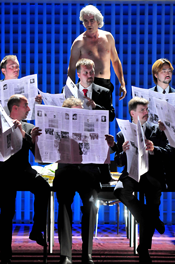
17 Nov 2008
Opera in Germany
Following a recent visit to Germany, Wes Blomster surveys the vibrant opera scene in Berlin and Magdeburg.
English Touring Opera are delighted to announce a season of lyric monodramas to tour nationally from October to December. The season features music for solo singer and piano by Argento, Britten, Tippett and Shostakovich with a bold and inventive approach to making opera during social distancing.
This tenth of ten Live from London concerts was in fact a recorded live performance from California. It was no less enjoyable for that, and it was also uplifting to learn that this wasn’t in fact the ‘last’ LfL event that we will be able to enjoy, courtesy of VOCES8 and their fellow vocal ensembles (more below …).
Ever since Wigmore Hall announced their superb series of autumn concerts, all streamed live and available free of charge, I’d been looking forward to this song recital by Ian Bostridge and Imogen Cooper.
The Sixteen continues its exploration of Henry Purcell’s Welcome Songs for Charles II. As with Robert King’s pioneering Purcell series begun over thirty years ago for Hyperion, Harry Christophers is recording two Welcome Songs per disc.
Although Stile Antico’s programme article for their Live from London recital introduced their selection from the many treasures of the English Renaissance in the context of the theological debates and upheavals of the Tudor and Elizabethan years, their performance was more evocative of private chamber music than of public liturgy.
In February this year, Albanian soprano Ermonela Jaho made a highly lauded debut recital at Wigmore Hall - a concert which both celebrated Opera Rara’s 50th anniversary and honoured the career of the Italian soprano Rosina Storchio (1872-1945), the star of verismo who created the title roles in Leoncavallo’s La bohème and Zazà, Mascagni’s Lodoletta and Puccini’s Madama Butterfly.
Evidently, face masks don’t stifle appreciative “Bravo!”s. And, reducing audience numbers doesn’t lower the volume of such acclamations. For, the audience at Wigmore Hall gave soprano Elizabeth Llewellyn and pianist Simon Lepper a greatly deserved warm reception and hearty response following this lunchtime recital of late-Romantic song.
Collapsology. Or, perhaps we should use the French word ‘Collapsologie’ because this is a transdisciplinary idea pretty much advocated by a series of French theorists - and apparently, mostly French theorists. It in essence focuses on the imminent collapse of modern society and all its layers - a series of escalating crises on a global scale: environmental, economic, geopolitical, governmental; the list is extensive.
For this week’s Live from London vocal recital we moved from the home of VOCES8, St Anne and St Agnes in the City of London, to Kings Place, where The Sixteen - who have been associate artists at the venue for some time - presented a programme of music and words bound together by the theme of ‘reflection’.
'Such is your divine Disposation that both you excellently understand, and royally entertaine the Exercise of Musicke.’
Amongst an avalanche of new Mahler recordings appearing at the moment (Das Lied von der Erde seems to be the most favoured, with three) this 1991 Mahler Second from the 2nd Kassel MahlerFest is one of the more interesting releases.
‘And there was war in heaven: Michael and his angels fought against the dragon; and the dragon fought and his angels, And prevailed not; neither was their place found any more in heaven … that old serpent … Satan, which deceiveth the whole world: he was cast out into the earth, and his angels were cast out with him.’
If there is one myth, it seems believed by some people today, that probably needs shattering it is that post-war recordings or performances of Wagner operas were always of exceptional quality. This 1949 Hamburg Tristan und Isolde is one of those recordings - though quite who is to blame for its many problems takes quite some unearthing.
There was never any doubt that the fifth of the twelve Met Stars Live in Concert broadcasts was going to be a palpably intense and vivid event, as well as a musically stunning and theatrically enervating experience.
‘Love’ was the theme for this Live from London performance by Apollo5. Given the complexity and diversity of that human emotion, and Apollo5’s reputation for versatility and diverse repertoire, ranging from Renaissance choral music to jazz, from contemporary classical works to popular song, it was no surprise that their programme spanned 500 years and several musical styles.
The Academy of St Martin in the Fields have titled their autumn series of eight concerts - which are taking place at 5pm and 7.30pm on two Saturdays each month at their home venue in Trafalgar Square, and being filmed for streaming the following Thursday - ‘re:connect’.
The London Symphony Orchestra opened their Autumn 2020 season with a homage to Oliver Knussen, who died at the age of 66 in July 2018. The programme traced a national musical lineage through the twentieth century, from Britten to Knussen, on to Mark-Anthony Turnage, and entwining the LSO and Rattle too.
With the Live from London digital vocal festival entering the second half of the series, the festival’s host, VOCES8, returned to their home at St Annes and St Agnes in the City of London to present a sequence of ‘Choral Dances’ - vocal music inspired by dance, embracing diverse genres from the Renaissance madrigal to swing jazz.
Just a few unison string wriggles from the opening of Mozart’s overture to Le nozze di Figaro are enough to make any opera-lover perch on the edge of their seat, in excited anticipation of the drama in music to come, so there could be no other curtain-raiser for this Gala Concert at the Royal Opera House, the latest instalment from ‘their House’ to ‘our houses’.
"Before the ending of the day, creator of all things, we pray that, with your accustomed mercy, you may watch over us."

Following a recent visit to Germany, Wes Blomster surveys the vibrant opera scene in Berlin and Magdeburg.
Juicy Three Oranges, a Dutchman that doesn’t fly and Boris in the boondocks
On the heels of Hitler, Germans, eager to be known again as the people of poets and thinkers — Dichter und Denker — flattered themselves with a joke. Give Germans the choice — it went — between going to Heaven and going to a lecture about Heaven, they would choose the latter.
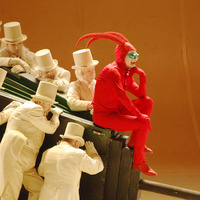 The joke wouldn’t get many laughs today — at least not in Berlin,
where the longest at the moment are neither for Heaven nor a lecture about
it, but for Madame Tussaud’s wax museum that recently opened on Unter den
Linden in the shadow of the Brandenburg Gate.
The joke wouldn’t get many laughs today — at least not in Berlin,
where the longest at the moment are neither for Heaven nor a lecture about
it, but for Madame Tussaud’s wax museum that recently opened on Unter den
Linden in the shadow of the Brandenburg Gate.
Nonetheless the ability of Germans to ferret out profundity astonishes. Take, for example, the production of Prokofiev’s Love for Three Oranges now on stage at the Komische Oper here. It’s an evening of fun and fluff welcome among stagings that leave one intellectually exhausted from trying to outguess directors who bring supposedly new insights to well-know works. But then turn to the KO program book and you’ll learn that Three Oranges is really an essay on the fate of theater in the still-young Soviet Union.
Prokofiev turned his back on the fruits of revolution in 1918. He wrote Oranges in Paris, and it was premiered in Chicago in 1921, when famed soprano Mary Garden ran the opera there. (“She was never around,” sighed Prokofiev. “She was off working on her own roles.”) It would thus seem to have little to do with Russia.
In 1917, however, Vsevelod Meyerhold, the great genius of Russian theater, had done a version of Carlo Gozzi’s commedia dell’arte L’amore delle tre melarance that provided Prokofiev with his libretto and led the composer to make of it an opera that took into account the demands that people made on the theater — and that the theater in a new society committed to the arts could reasonably make on them.
Knowing this brought depth, of course, to KO production, which, on the other hand, was a total success simply as joyous music theater very well done. Indeed, it’s not surprising that the KO is where Berliners go for an evening of great entertainment that does not perplex the mind.
This production, seen on October 26, further had a note of poignancy about it, for it is the brain child of KO general director Andreas Homoki, who is about to leave the company. Homoki has elevated the KO to the level of excellence that it knew under its founding director Walter Felsenstein, the man who laid the foundation of modern music theater in Germany after the war. It was Homoki who brought to the KO the quality and prestige that caused Opernwelt, Germany’s top opera magazine, to name the company “opera of the year” two seasons ago.
Leading roles in Oranges were sung by Finnur Bjornson (Prince), Carsten Sabrowski (King) and Aurelia Hajek and Renatus Mesá’s (Good and Bad Magicians, respectively). Stefan Blunier conducted an impressive orchestra. Meyerhold, by the way, gave up on his hopes for an artists’ paradise in the USSR and killed himself.
Karl Marx did not die along with the demise of Germany’s sometimes violent New Left in the late years of the past century; he’s just been hiding out in the wings of Berlin’s Deutsche Oper, secure in the knowledge that his day would come again. And with Capitalism teetering on the brink, it may indeed now have come.
Proving furthermore that the arts are ahead of politics, Marx’s resuscitation was anticipated by the production of Wagner’s Flying Dutchman that debuted in June at this largest of Berlin’s three opera houses. This is the work of Tatjana Gürbaca, yet another director rooted in the theatrical theories of Bert Brecht and his major disciple in the world of music theater Ruth Berghaus. Gürbaca saw what was coming and that left her no time for wind and waves — or for ships or even a suggestion thereof. She had weightier matters in mind.
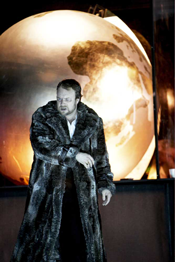 Johan Reuter as Fliegender Holländer [Photo by Matthias Horn]
Johan Reuter as Fliegender Holländer [Photo by Matthias Horn]
Act One plays in a rowdy room that combines bourse, bar and bordello.
Father Daland, a shipping tycoon and father of globalization is a capitalist
Everyman, ready in his commitment to the market to sell off his daughter
Senta to a tough-looking vagrant in bowler and beaver coat.
Things don’t look at all like Norway, and Gürbaca explains in the DO program book that this is Paris, a city that Wagner, on the heels of years of near-starvation there, wanted to see go up in flames because of its capitalist excesses. (In Wagner it’s always Götterdämmerung time somewhere.)
As the act ends Daland rushes off to tell Senta to get her make-up straight, while the unhappy Dutchman collapses in a chair. A chorus member hangs a “Just Married” sign — in English — on him. (Marx lived in England.) Even experienced Luddites would have a hard time figuring what is going on in Act Two, for there’s not a hint that spinning wheels have given way to power looms.
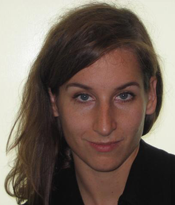 Tatjana Gürbaca
Tatjana Gürbaca
One sees rather in a high-tech beauty emporium, where women — under
Capitalism always a chief (and cheap) commodity — are getting gussied up at
long tables with mirrors. Senta, of course, will have none of this. She’s
lost in her dreams about the dark Wanderer savable only through her
sacrifice.
Boy friend Erik, whom Senta did after all promise to marry, is more important to Gürbaca than to other directors, for whom he is only an unwelcome stumbling block to be brushed aside after some attractive lines for a budding — or aged — Heldentenor. But Erik is a hunter, a sweat-of-the-brow guy, a well-integrated member of an economic order not involved in the exploitation of others — unless, of course, you happen to be a wild boar. Erik is the real loser here, and — with Gürbaca — we’re all firmly on his side.
The finest moment in this act is when four giggling girls (the giggle is not in the score) push a baby buggy between Senta and the Dutchman in the middle of their big duet. (This is the kind of thing, Brecht would tell us, that makes people think.)
A literally bright moment in the final act — the DO Dutchman is played, as Wagner wished, without intermission — comes when Senta’s bridal veil is burned in the baby carriage. One might as well have fun with the buggy — and the veil, for Senta will have no need for either. After slitting Erik’s throat (“Remember Erik?” Anna Russell might ask), she cuts her own jugular, and the rest of the women do likewise. (Pity perhaps, on the other hand the libretto had earlier speculated — oh suggestive line! — that all these virile he-men seemed not to need women.)
Gürbaca is an obviously bright woman, and one wishes that Alan Greenspan had read the brilliant essays in the DO program book before applauding Dubya’s economic policies. One wishes that what she had in mind with this production worked.
Alas, it doesn’t. It doesn’t work at all, and word about that has gotten around Berlin, for you could have hunted deer in the first balcony on October 25, when the house was half empty. That was a shame, for musically it was a superb evening.
Johan Reuter is austere and awesome Dutchman, and Manuela Uhl, although obvious hired at the end of the opera, an attractive and impressive Senta. Hefty Torsten Kerl — Erik — might well be the next great Heldentenor, and Reinhard Hagen earns high marks as Daland.
Daniel Klagner conducted an ensemble that ranks high in a city that suffers from an excess of great orchestras.
Magdeburg, a city of half a million an easy two-hour train ride from Berlin, all but disappeared from Western sight during its 40 years as an East-German industrial center. Today Magdeburg is eager to attract attention, and a major draw of the city is its ultra-modern 700-seat theater that opened in 1995.
In the States one would expect this to be the venue of a regional company performing three or four operas a year. For the current season Oper Magdeburg has slated five new productions — along with a dozen works already in the repertory.
Of special interest is the company’s staging of Mussorgsky’s original 1869 version of Boris Godounov that premiered on October 24. As the composer intended it, Boris is a straightforward, heavily dramatic work without the glitter and glamour added by Rimsky-Korsakov in the version more popular today.
Magdeburg brought the opera up to date with a modern-dress staging that opened with a 120-voice voice choir lining the sides of the auditorium while Nikitisch, a government official with a strong resemblance to an about-to-be American ex-president manipulated the election of a new czar.
Nikolaus Meer, with a white mane that makes him a Horostovsky look-alike, sang a strong and sympathetic Boris, bringing both beauty and pathos to the opening coronation and the later mad scene. The many supporting roles were well executed in a production marked by careful preparation and close attention to details by Vera Nemirova, a director whose work is respected and Vienna and is about to stage a new Ring in Frankfurt.
Magdeburg music director Francesco Corti conducted an astonishingly impressive orchestra that performs a full season of symphonic concerts as well. A bust in the foyer recalls that early in his career Wagner was Magdeburg’s music director.
Opera Magdeburg is clearly making its mark.
Virtuoso vocalists
In mid-October two of today’s finest singers — Americans both — appeared as soloists with Berlin’s top orchestras in the city’s famous and acoustically perfect Philharmonie: Deborah Polaski and Kelley O’Connor. With the Berliner Staatskapelle and its music director Daniel Barenboim Polaski, for almost two decades the leading incarnation of Wagner’s most dramatic female figures, sang Arnold Schoenberg’s Six Orchestral Songs, Op. 8.
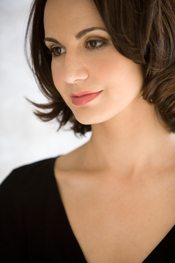 Kelley O’Connor
Kelley O’Connor
Completed in 1805, before his embrace of atonality, these are the first
songs, in which Schoenberg turned from piano to orchestral accompaniment.
They further embrace an expressive range that reaches from the late
Romanticism of Wagner and Strauss of the opening Natur to the more
advanced idiom of the three Petrarch texts that conclude the cycle.
Polaski, who between 1988 and 1998, sang more Brünnhilde’s at the Bayreuth Festival than any other singer since World War Two, is a commanding presence in the concert hall. She delivered the rarely heard songs with full appreciation of their shifting style, benefiting of course from her long collaboration with Barenboim.
It is impossible to put aside sentiment in hearing Peter Lieberson’s five Neruda Songs, for they stand today as the composer’s superb creative act of homage to his late wife Lorraine Hunt. The soprano premiered the songs, a declaration of love that reaches beyond the intimately personal to a universal celebration of this most problematic of human entanglements.
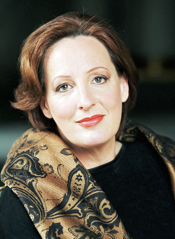 Deborah Polaski
Deborah Polaski
Lieberson discovered the 100 sonnets by Pablo Neruda shortly after meeting
Hunt in 1997. She premiered them in 2005 — and died of cancer the following
year. Although it might seem an act of trespassing for another vocalist to
sing the songs, with her gentle and modest humanity Kelley O’Connor, now
the leading interpreter of them, magnifies the act of homage that they
originally were.
She sang them last summer at the Aspen Festival with Lieberson in the audience and has repeated them since with the Chicago Symphony under Bernard Haitink, who — due to illness — was replaced on the podium of the Berlin Philharmonic by David Zinman, who had conducted the Aspen performance.
Although one hardly thinks of any singer as closely associated with Spanish music, O’Connor launched her career by creating the role of Federico Garcia Lorca in Osvaldo Golojov’s Ainadamar at Tanglewood in 2003 and then repeating this role around the world in the composer’s later expansion of the work.
O’Connor has a thrillingly rich lower register that is especially well suited to the haunting spirit of both Neruda’s verse and Lieberson’s setting of it, for an anticipation of death is present in both.
Berlin takes Onegin out of the birches
Stravinsky called Eugene Onegin the “most Russian” of Tchaikovsky’s operas, and scholar Vissarion Belinsky viewed the 1879 work as “an encyclopedia of Russian life.” Achim Freyer, director of the Onegin currently on stage at Berlin’s Staatsoper, does not share these opinions. In an essay in the company’s program book he insists that “today St. Petersburg is everywhere” and that this story could now be set in Dubai , out in the country or in Berlin with equal validity. Not everyone agrees, and the current Onegin that — new in September — was the Staatsoper’s major contribution to the 2008 Berlin fall festival, has given rise to a controversy that recalls the 1913 Paris premiere of Stravinsky’s “Rite of Spring.”.
On October 22, however, when the production was on stage for the seventh time this season, no one left the packed hall until uniform applause had declared Freyer’s concept a success. And it was a fine final touch that Daniel Barenboim, the evening’s conductor and music director of the Staatsoper, brought the entire Staatskapelle, his pit band, to the stage to share this approval.
Over-the-top opera productions are the norm in Germany, the land of Regieoper that puts the director totally in charge. Nonetheless Freyer had a hard act to follow in the Onegin new at Munich’s Bavarian State Opera last season. With thoughts of “Brokeback Mountain” obviously in mind Polish director Krzystof Warlikowski, a former assistant of Peter Brook, moved Tchaikovsky’s Russians to the American West. And, viewing the work primarily as the composer’s confrontation with his own homosexuality, Warlikowski focused attention on the close relationship between Onegin and his friend Lensky. (“Close?” Close indeed, for at one point Warlikowski had them in bed together.)
Freyer, about to launch the first “Ring des Nibelungrn” native to Los Angeles, goes in quite another direction. (Long in the wings, Luc Bondy had once been engaged to direct the Los Angeles Opera project.) For Freyer Onegin is rather a summation of the sentiments, sensations and — above all — the melancholy that were the heritage of the 19th century both in Russia and beyond. The director writes of that world as one of “loneliness, longing and boredom, of renunciation and rationality…but always with the hope of love fulfilled as its driving force.” Freyer, now 74 and once a Berlin student of Bert Brecht at his epoch-making (East) Berlin Ensemble, brings the hand of his teacher to rest on Onegin and his age.
Tchaikovsky called Onegin not an opera, but a series of “lyric scenes,” and Freyer treats it as a scenic oratorio. The entire cast is almost always present on a sharply raked empty stage; each stands alone, and they all face the audience. There is no direct exchange between them. Their loneliness and isolation cries out. Occasional wooden chairs — sometimes suspended in the air — are the only props. Costumes suggesting current dress are soiled white, and grease-painted faces are white with exaggerated facial features. Taking a cue perhaps from the slow-motion choreography of Robert Wilson, characters stay almost entirely in one place, restricting motion to arm and hand gestures.
The art of mime is heavily involved, and as Lensky Rolando Villazon is a Marcel Marceau look-alike. Huge eyes recall the once overly popular paintings by Margaret Keane.
Americans, inexperienced in such experimentation, would have a difficult time with this “Onegin.” Brecht, however, would have loved it, for it is a masterpiece of his theater of alienation, in which Freyer has opened a critical distance between stage and audience to fight what Brecht called the “culinary” theater of illusion that draws the spectator into the drama on stage. This is theater for the thinking man out to change the world.
Central to this approach is the primacy of the text, which makes clear that — despite the title — it’s Tatiana who is the central figure of “Onegin.” And in Anna Samuli, who in four seasons with the Staatsoper has made Violetta and Donna Anna signature roles, Freyer has a near-ideal Tatiana, youthful, but with a voice that despite its power made what Onegin calls her “chaste love” credible. Samuli was Barenboim’s Tatiana when he conducted Onegin with the Vienna Philharmonic at the Salzburg Festival in2007.
Things were complicated at the October 22 performance, when Villazon, slated to sing Lensky, was ill. He appeared before the performance, explained the situation in impeccable German and announced that Serghei Khomov would sing the role from the side of the stage, while he participated as actor only. (The illusion of a singing Villazon would have benefited from lip-singing on the tenor’s part.)
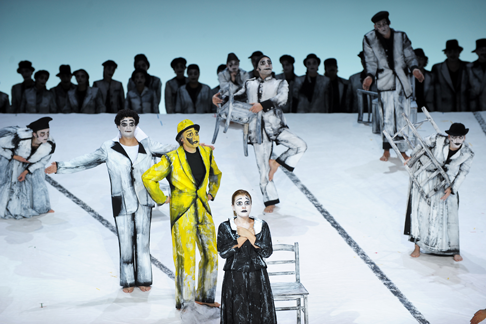 A scene from Eugene Onegin [Photo by Monika Rittershaus]
A scene from Eugene Onegin [Photo by Monika Rittershaus]
Roman Trekel, the Staatsoper’s leading bass when René’ Pape is not in town, is an elegant and appropriately aristocratic Onegin who does not overplay his hand either in refusing Tatiana’s offer of love or in his outcry “Oh, my miserable fate!” that ends the drama.
It is, of course, Barenboim who made the production work. He understands Freyer’s intentions and supports the director fully in making this an evening of overwhelming music drama. Given the intensity of the staging it would be senseless to interrupt its impact with actual dancing of either the famous first-act Waltz or the spirited Polonaise that opens Act Three. Indeed, on the heels of the duel that leaves a red-bathed Lenski still standing at the rear of the stage Barenboim plunges from the duel into the Polonaise with a fury that brings the drama to a head. Lensky’s then collapses, the source of a lake of black blood then covers the entire stage. (To achieve the effect the off-white fabric that had covered the entire stage is slowly withdrawn. It’s hard to describe, but the effect is tremendous.)
The first reaction is, that although interesting, one would not want to see this Onegin again. But one gets up the next morning thinking of nothing else and wishing it were on stage again that night.
Freyer is his own designer.
Onegin was sung in Russian with German surtitles.
As a footnote, a shot of cultural sociology: I have lived in Berlin for long periods since 1954 and thus knew the city — and the Staatsoper before the Wall went up in 1961. And during the almost four decades that the Wall stood, I spent extended periods in East Berlin as an exchange scholar. What amazes me today — as the city prepares to commemorate the 20th anniversary of the fall of the Wall — is how divided Berlin remains and how obvious this is at musical events in the former East.
In the past two years I have been here at Easter, when Simon Rattle and his “sacred cow” Philharmonic are off in Salzburg, performing for an international audience at the spring festival founded there by Herbert von Karajan. Thus Easter finds the Philharmonic’s Berlin hall free, and Barenboim and his Staatskapelle seize the opportunity to show their stuff with the Berliner Festage, a spring festival founded by the East decades ago to counter the appeal of West Berlin’s September Festwochen.
The Festage draw their own international audience. (It was during this spring festival that two years ago I heard the Mahler cycle for which Barenboim and Pierre Boulez shared the Staatskapelle podium. I mention this here because the cycle comes to Carnegie Hall in the spring.)
But I digress.
The Easter festival brings an international audience to Berlin; “Onegin,” as I saw it at the Staatsoper on an inauspicious Wednesday in October fills the historic house largely with subscription holders, and I was amazed at the ease with which I can still distinguish “Ossis” from “Wessis” — to use the categories now long common here — in this audience. One sees it in their clothes; one sees it in the women’s frizzy permanents, but above all one sees it in their behavior. Opera remains for them something special — as they were taught that it was by the former Communist government that kept top-priced tickets at the Staatsoper at 15 marks East — totaling around $1.00 at the then rate of exchange — for forty years.
This is their night out, and subscriptions continue to make the Staatsoper and its orchestra somewhat affordable. A season ticket for the eight concerts by the Staatskapelle are available at Euros 118 with the unusually strong dollar bringing up to Euro .74. And — happy day! — the Staatsoper is flooded by youth, where the East-West divide is far less evident.
All this makes a run-of-the mill evening at the Staatsoper something to be studied. Drop down to the buffet; enjoy a glass or Rottka”ppchen champagne — one of the few Eastern products to survive reunification — and study this show-within-a-show! Finally: three years “in exile” are coming up for the Staatsoper. Its house — it’s still essentially the structure built by Friedrich the Great that opened in 1742 — has been destroyed and rebuilt numerous times during Germany’s turbulent history and is now slated for badly needed total reconstruction.
What is to be done with the house is locally the subject of heated debate with one party calling for the construction of a hyper-modern auditorium within its historic walls. What visitors to Berlin need to know is that, beginning in the fall of 2009 and continuing for the next three years, the Staatsoper will be at home in the Schiller Theater, a modern venue once the pride of West Berlin and largely unused since Berlin has again been one city.
Wes Blomster